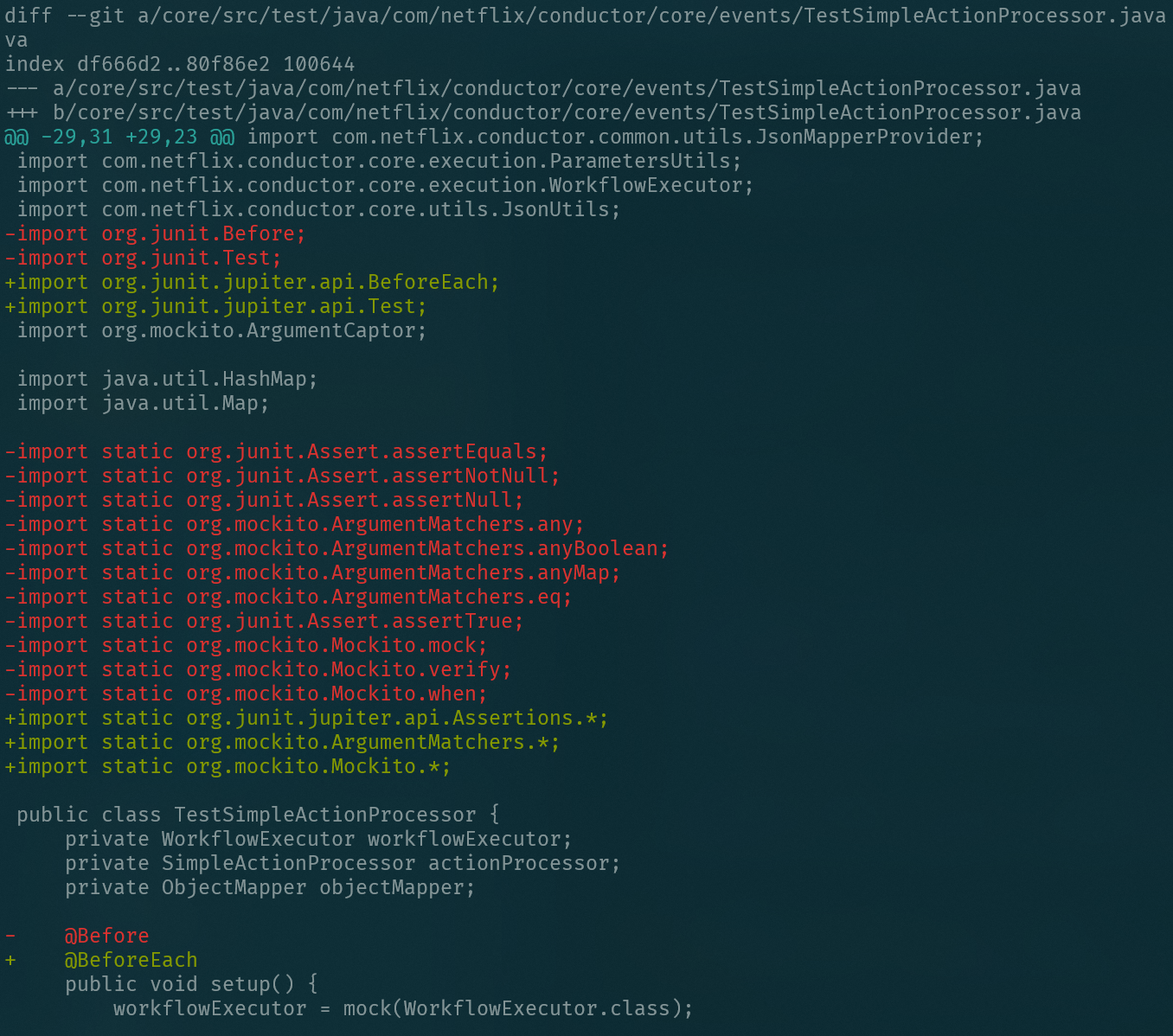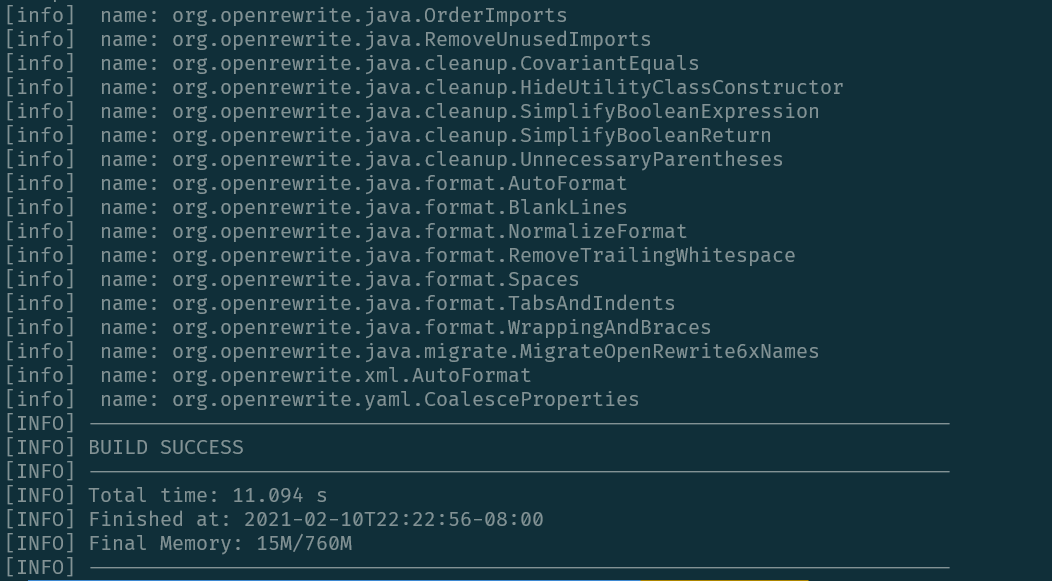Gradle plugin configuration
The OpenRewrite Gradle Plugin is the fastest way to apply OpenRewrite recipes to your code as part of your Gradle build. The OpenRewrite Gradle Plugin is compatible with all versions of Gradle since 4.0.
Plugin configuration
Apply the org.openrewrite.rewrite plugin to your build.
plugins {
id("java")
id("org.openrewrite.rewrite") version("latest.release")
}
rewrite {
// OpenRewrite Extension Configuration
}
// Ensure a repository is declared that the rewrite core libraries can be resolved from
repositories {
mavenCentral()
}
With the plugin applied, the rewrite DSL is available for configuration.
Multi-module Gradle projects
When applied to a multi-project build, plugin behavior differs depending on whether the plugin is applied to the root project or to a sub-project. Applied to the root project, the plugin will parse and refactor all sources from all projects. Applied to any project other than the root project, the plugin will parse and refactor only sources from that project.
The rewrite Gradle plugin resolves the rewrite core libraries and any recipe modules added to the rewrite configuration at runtime. It will attempt to resolve them from whatever repositories are available to the project. This is accomplished by adding Maven Central, or a mirror of it, to your project's repositories:
repositories {
mavenCentral()
}
Configuring the 'rewrite' DSL
The rewrite DSL exposes a few configuration options:
-
activeRecipe- Explicitly turns on recipes by name (the name given in thespecs.openrewrite.org/v1beta/reciperesource). No recipe is run unless explicitly turned on with this setting. -
activeStyle- Explicitly turns on a style by name (the name given in thespecs.openrewrite.org/v1beta/styleresource). No style is applied unless explicitly turned on with this setting. -
configFile- Where to look for an OpenRewrite YML configuration file somewhere in the project directory (or really anywhere on disk). This file is not required to exist. If not specified otherwise, the default value is<project directory>/rewrite.yml. -
exportDatatables- Boolean flag toggling whether the plugin should export the data tables generated by the active recipes. The default isfalse. The resulting files can be found in the directory<build directory>/reports/rewrite/datatables/<timestamp>. -
failOnDryRunResults- Boolean flag toggling whetherrewriteDryRunshould throw an exception and non-zero exit code if changes are detected. The default isfalse. -
sizeThresholdMb- Threshold over which non-Java sources are ignored during parsing. The default threshold is 10Mb. -
exclusion- One or more paths, relative to the project the plugin is applied to, where non-Java sources are ignored during parsing. Supports glob patterns. -
plainTextMasks- A set of file masks to denote which files should be parsed as plain text. Evaluated as a PathMatcher glob pattern, where "**" matches any number of directories and "*" matches a single directory or filename. Exclusions take precedence over any plain text masks. If this configuration is not explicitly defined the default masks are:Default masks**/META-INF/services/**
**/.gitignore
**/.gitattributes
**/.java-version
**/.sdkmanrc
**/gradlew
**/*.sh
**/*.bash
**/*.bat
**/*.ksh
**/*.txt
**/*.jsp
plugins {
id("java")
id("org.openrewrite.rewrite") version("latest.release")
}
repositories {
mavenCentral()
}
rewrite {
activeRecipe("com.yourorg.ExampleRecipe", "com.yourorg.ExampleRecipe2")
activeStyle("com.yourorg.ExampleStyle", "com.yourorg.ExampleStyle2")
exclusion(
// Excludes a particular yaml file
"subproject-a/src/main/resources/generated.yaml",
// Exclude all json files
"**/*.json"
)
plainTextMask("**/*.txt")
// These are default values, shown for example. It isn't necessary to supply these values manually:
configFile = project.getRootProject().file("rewrite.yml")
failOnDryRunResults = false
sizeThresholdMb = 10
}
Activating OpenRewrite recipes
All OpenRewrite libraries and modules are published to MavenCentral. Use the repositories Gradle DSL to ensure that your build can resolve dependencies from there or one of its mirrors.
No recipe is ever run on your codebase without being explicitly activated in the plugin's configuration. To make pre-packaged OpenRewrite recipes available for activation, add Rewrite's bill of materials along with the specific rewrite dependencies:
dependencies {
rewrite(platform("org.openrewrite.recipe:rewrite-recipe-bom:latest.release"))
rewrite("org.openrewrite.recipe:rewrite-spring")
}
Once a pre-packaged recipe has been added to the rewrite dependency configuration, you can tell the Gradle plugin to activate it the rewrite DSL. For example, here is how you would activate the org.openrewrite.java.testing.junit5.JUnit5BestPractices recipe that comes with rewrite-testing-frameworks in a single-project Gradle build:
plugins {
id("java")
id("org.openrewrite.rewrite") version("latest.release")
}
repositories {
mavenCentral()
}
dependencies {
testImplementation("junit:junit:4.13")
rewrite(platform("org.openrewrite.recipe:rewrite-recipe-bom:latest.release"))
rewrite("org.openrewrite.recipe:rewrite-testing-frameworks")
}
rewrite {
activeRecipe("org.openrewrite.java.testing.junit5.JUnit5BestPractices")
}
The "Run" task
Execute gradle rewriteRun to run the active recipes and apply the changes. This will write changes locally to your source files on disk. Afterward, review the changes, and when you are comfortable with the changes, commit them. The run goal generates warnings in the build log wherever it makes changes to source files.

After the goal finishes executing, run git diff (or your VCS system's equivalent) to see what changes were made, review, and commit them.

JVM args that can be added to the Gradle command line
It is possible to control the active recipe and style using JVM arguments in the command line.
- To change the active recipe, you can specify either
rewrite.activeRecipeorrewrite.activeRecipes(both do the same thing and take the same input). - To change the style, you can specify either
rewrite.activeStyleorrewrite.activeStyles(both do the same thing and take the same input).
Here's an example of what this might look like if you were to use rewriteRun with an init script:
gradle rewriteRun --init-script init.gradle -Drewrite.activeRecipe=org.openrewrite.FindSpringUses
In general, it's best to default to not passing in any styles and to allow rewrite to detect the styles itself. If you need to, though, you can always append -Drewrite.activeStyle to the end of the command:
-Drewrite.activeStyle=com.yourorg.YesTabsNoStarImports
The "dryRun" task
Execute gradle rewriteDryRun to dry-run the active recipes and print which visitors would make changes to which files in the build log. This does not alter your source files on disk at all. This goal can be used to preview the changes that would be made by the active recipes.
rewriteDryRun outputs a report in the form of a patch file, by default under build/reports/rewrite/rewrite.patch, containing changes that would be made if you were to run rewriteRun. This patch file can be used with git or diff to view or apply the potential changes. For example, git diff . build/reports/rewrite/rewrite.patch.

rewriteDryRun can be used as a "gate" in a continuous integration environment by failing the build if rewriteDryRun detects changes to be made and failOnDryRunResults is set to true:
rewrite {
// ...
failOnDryRunResults = true
}
If desired, rewriteDryRun can be configured so that when check runs, rewriteDryRun does too:
tasks.named("check").configure {
dependsOn(tasks.named("rewriteDryRun"))
}
The "Discover" task
Execute gradle rewriteDiscover to list the recipes available on your classpath.
